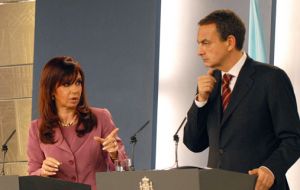MercoPress. South Atlantic News Agency
Argentina and Spain admit difficult economic relations
 Pte. CFK and her counterpart Zapatero
Pte. CFK and her counterpart Zapatero Visiting Argentine president Cristina Fernández de Kirchner and Spanish president Jose Luis Rodriguez Zapatero, admitted on Tuesday difficulties in the economic relations but emphasized that bilateral relations are excellent.
"In spite of economic storms and serious difficulties what really matters is that in the last five years we've strengthened the close links between Argentina and Spain" said Mrs Kirchner. "Difficulties in our economic and investment relations exist, they are complicated, and as Spanish government it is my duty to support Spanish companies, but this does not mean bilateral relations are strained", said Rodriguez Zapatero in direct reference to the dispute over the re-nationalization of Argentina's flag carrier Aerolineas, so far with no compensation for Spanish owners Marsans. The Aerolineas issue and the hard line from the Kirchner administrations towards foreign owned companies, particularly from Spain, Argentina's main investor, had postponed Cristina Fernandez's visit to Madrid several times. Addressing the Spanish Congress Mrs. Kirchner described the link with Spain "not only economic, financial but also historic, cultural and affectionate". But the Argentine president looking back into her country's recent history "of collective claims and not much hopes", sent a strong message: "There are no chances of business and industry profits without a community that feels it is sharing those earnings and benefits". "We are living in a world of unimaginable difficulties, thus we must work together and from consensus positions" to address the global crisis, she added. Mrs. Kirchner also called on Spanish lawmakers to imagine a different world "with different multilateral credit institutions" and called for a profound "re-structuring" of world organizations. "We need more democracy in multilateral credit and other organizations, but also in the performance roles of the international economy and changes to the rules of the game so everybody abides by them", underlined the Argentine president. "UN resolutions must not only be accepted by small countries, or those outside the Security Council. This prime league club can't ignore UN resolutions and shed them aside in a permanent and systematic way", she insisted arguing that a world with "rules to be enforced on the weakest and violated by the powerful" is not viable any more. Finally she blamed the so called "central countries" for the current global slowdown. "The crisis turned international, but it propagated from those economic centres which preached the absence of government and the absolute rule of markets: that model has failed".




Top Comments
Disclaimer & comment rulesCommenting for this story is now closed.
If you have a Facebook account, become a fan and comment on our Facebook Page!